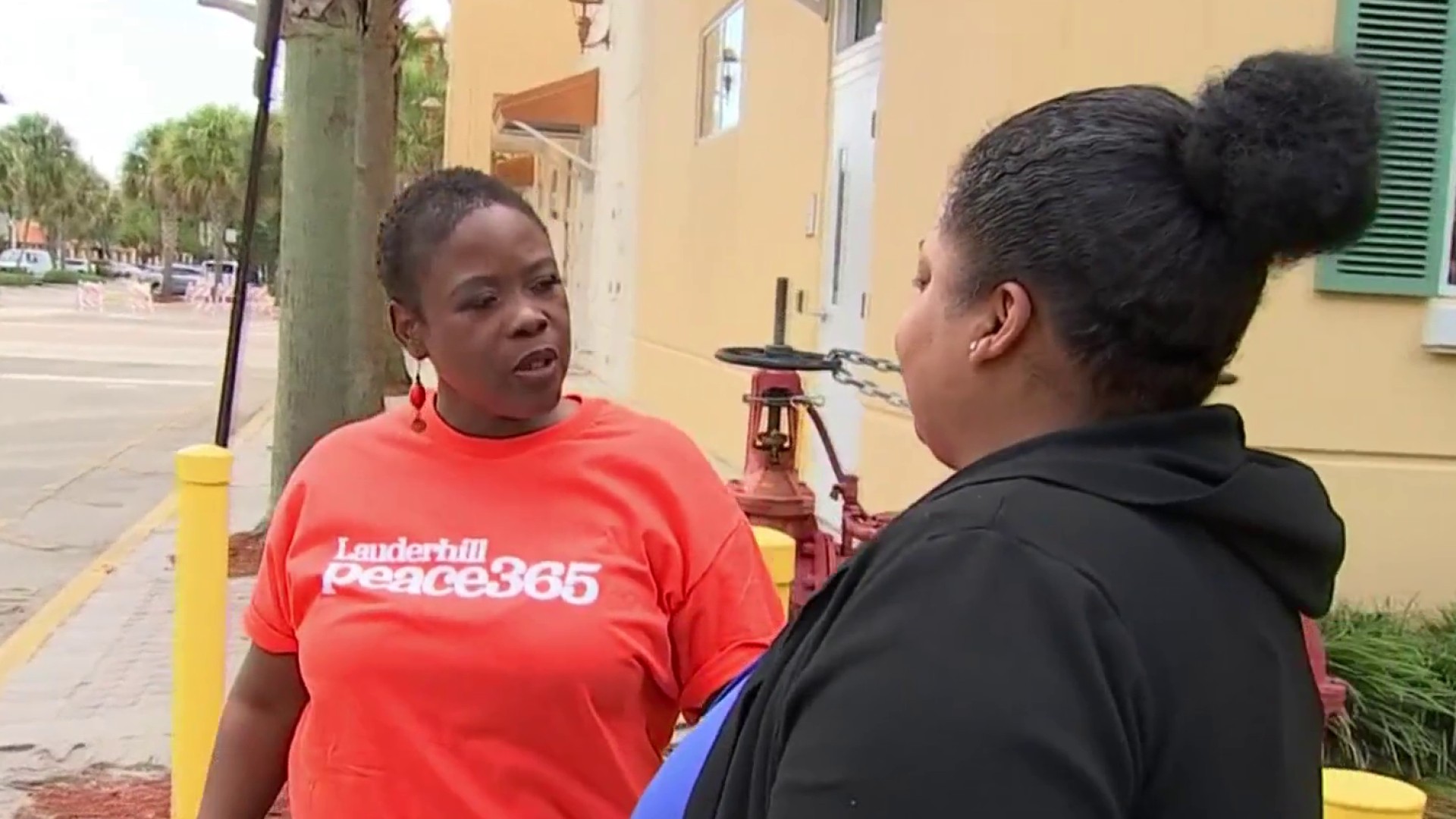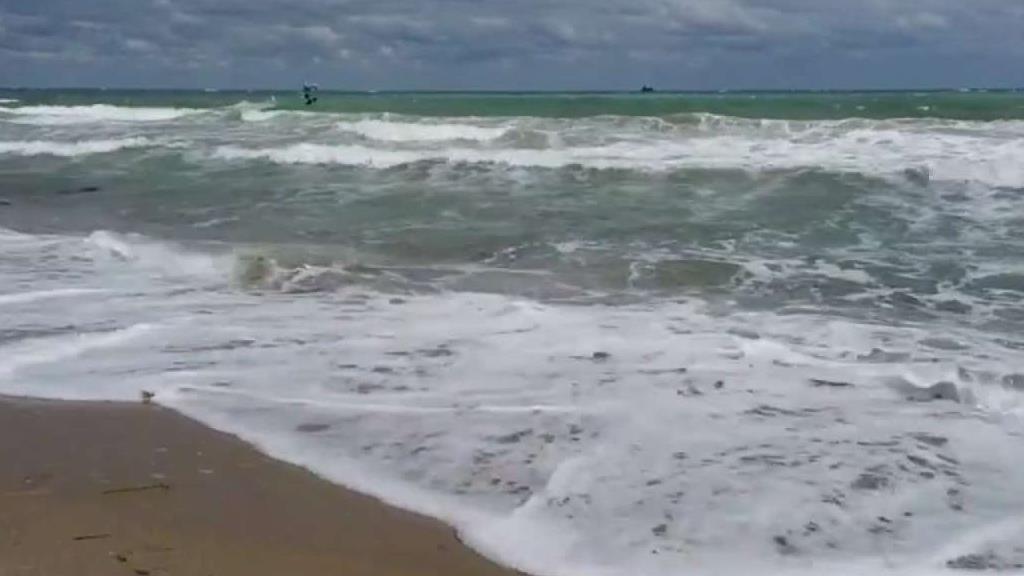Miami-Dade and Broward County have been spared the worst of deadly Hurricane Matthew. The storm stayed about 100 miles away from land in South Florida while moving north up the coast. The slower wind speeds led to minimal damage.
Thursday night, A Hurricane Warning for Broward County was downgraded to a Tropical Storm Warning. The Tropical Storm Warning for Miami-Dade and Monroe Counties was also canceled.
"The great news for Miami-Dade County is that the worst of the storm will be over by midnight," said Mayor Carlos Gimenez as he announced that the county is downgrading the response to the storm.
Hurricane Matthew is still a catastrophic Category 3 storm after leaving a path of destruction in the Caribbean.
The National Hurricane Center in Miami continues to call the storm "extremely dangerous." As of 5 AM, Matthew was packing maximum sustained winds of 120 miles per hour and was traveling northwest at 12 miles per hour.
"Get out ... this storm will kill you," Florida Gov. Rick Scott said during a news conference earlier Thursday, warning residents in the evacuation zones.
President Obama on Thursday issued an emergency declaration for Florida and ordered federal aid for the state.
Hurricane conditions were also still affecting the Bahamas. The storm is the most powerful to threaten the Atlantic coast in more than a decade.
A Florida utility company, Florida Power and Light, warned on Twitter that 2.5 million people could lose power from the storm. At 10 p.m., more than 52,200 people are reported without power in Miami-Dade, Broward and Palm Beach Counties.
The hurricane center extended a warning area to a large swath of Florida's east coast farther up to Altamaha Sound, Georgia. And it said a newly expanded hurricane watch area would now reach from the Altamaha Sound to the South Santee River in South Carolina.
Local
As Matthew put the U.S. in its sights, about 2 million people were encouraged to head inland.
Most of the deaths so far have been in Haiti, where heavy damage was reported. Its interior minister said the death toll had risen to 283. Six other deaths were reported in the Caribbean.
The concern about the hurricane is if it makes deviations from the path it's on.
A small move can mean a lot," Scott said. "It could mean the difference between life and death. That's why we have to prepare for a direct hit."
Either way, forecasters say it will come close enough to wreak havoc along the lower part of the East Coast, dumping up to 15 inches in rain in some spots. A storm surge of 5 feet to 8 feet was expected along the coast from central Florida into Georgia.
None of this mattered to John Long, who lives in the Florida town of Cape Canaveral.
"The hype is going to be worse than the actual storm. I feel I can do quite well," said Long, who owns a bike shop and plans to ride out the storm with his cat in his 32-foot recreational vehicle a half-mile from the ocean. He has lived in the Space Coast area for three decades. "There's always tremendous buildup and then it's no stronger than an afternoon thunderstorm. I'm not anticipating that much damage," he said Wednesday.
Scott has urged people to reconsider.
"This is a dangerous storm," Scott said. "The storm has already killed people. We should expect the same impact in Florida."
Scott announced that he had activated an additional 1,000 National Guard members to help with Matthew response and recovery efforts. There are 3,500 members now activated, more than half the available troops.
The Federal Emergency Management Agency has deployed officials to emergency operation centers in Florida, Georgia, South Carolina and North Carolina.
Warnings also were issued in Georgia and the Carolinas, where the storm is expected to arrive by the weekend. The last Category 3 storm or higher to hit the United States was Wilma in October 2005. It made landfall with 120 mph winds in southwest Florida, killing five people as it slashed across the state.
In South Carolina, Gov. Nikki Haley reversed the lanes of Interstate 26 for the first time on Wednesday so that all lanes of traffic were headed west and out of Charleston. Plans to reverse the lanes were put in place after hourslong traffic jams during Hurricane Floyd in 1999.
She said that as of 6 a.m. Thursday morning, 175,000 people have left, which "isn't enough" and urged people to leave as soon as possible.
South Carolina wants a total of about 500,000 people to evacuate. Florida urged or ordered about 1.5 million to leave the coast, said Jackie Schutz, a spokeswoman for Scott. In Georgia, Gov. Nathan Deal on Thursday ordered a mandatory evacuation east of Interstate 95 for six coastal counties-- Bryan, Chatham, Liberty, McIntosh, Glynn and Camden. The voluntary evacuation request, issued Wednesday remains in effect for residents west of I-95 in those counties.
On Tybee Island, home to Georgia's largest public beach, Loren Kook was loading up his pickup truck with suitcases and a computer late Wednesday afternoon. He and his wife were trying to decide whether to board up their windows overlooking the marsh grasses of Horsepen Creek before hitting the road to metro Atlanta.
"It seems like a lot of the longtime residents are staying," said Kook, who moved to the coast four years ago. "I've never sat through a Category Whatever. I'll watch it on TV."
Despite evacuation orders and dire warnings, Robert and Georgette Tyler said they were staying put in their 500-square foot rental home in Cape Canaveral, undeterred that Matthew might soon be pounding at their door.
Taking a break from putting plywood on windows, Robert Tyler said he feared getting stuck in traffic and that it was too much trouble to pack up his motorcycles and firearms. He has two generators, 50 gallons of fuel and enough food and water for a week. Plus, he is a handyman and his phone will be ringing off the hook once the storm passes.
"It's part of Florida life I guess, especially on the coast," he said.



